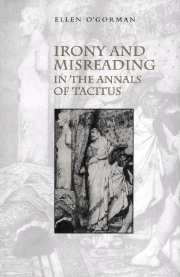Book contents
- Frontmatter
- Contents
- Dedication
- Preface
- 1 Introduction: irony, history, reading
- 2 Imperium sine fine:problems of definition in Annals 1
- 3 Germanicus and the reader in the text
- 4 Reading Tiberius at face value
- 5 Obliteration and the literate emperor
- 6 The empress's plot
- 7 Ghostwriting the emperor Nero
- 8 Conclusion: the end of history
- Bibliography
- General index
- Index locorum
2 - Imperium sine fine:problems of definition in Annals 1
Published online by Cambridge University Press: 30 September 2009
- Frontmatter
- Contents
- Dedication
- Preface
- 1 Introduction: irony, history, reading
- 2 Imperium sine fine:problems of definition in Annals 1
- 3 Germanicus and the reader in the text
- 4 Reading Tiberius at face value
- 5 Obliteration and the literate emperor
- 6 The empress's plot
- 7 Ghostwriting the emperor Nero
- 8 Conclusion: the end of history
- Bibliography
- General index
- Index locorum
Summary
Every narrative, however seemingly ‘full’, is constructed on the basis of a set of events that might have been included but were left out … And this consideration permits us to ask what kind of notion of reality authorizes construction of a narrative account of reality in which continuity rather than discontinuity governs the articulation of the discourse.
Hayden White, The Content of the Formboundlessness … See also continuity
Deborah Roberts, Francis Dunn and Don Fowler, index to Classical ClosureIn the introductory chapter I had already started to examine how Tacitus' designation of the Augustan regime as a versus status potentially draws a line of continuity between the principate and the civil wars which that regime claims to have resolved. Tacitus' use of the phrase, therefore, can be seen to dissent from the totalising claims of the principate: claims to order, stability, and continuity with a pre-civil war (republican) past. In contrast, Tacitus offers a different totalising claim about the principate: that it manifests the very same destructive elements of disorder within its regime. Thereby he counters the claim to continuity (totalising boundlessness) by redescribing it as a chaotic (totalising) boundlessness achieved by the collapse of definitions. This entails, most importantly, the collapse of the boundary between principate and civil war. I have gestured towards this ironic redescription by deploying the Virgilian phrase imperium sine fine, ‘empire without end’, in this Tacitean context where, I would argue, it becomes ‘empire without definition’.
- Type
- Chapter
- Information
- Irony and Misreading in the Annals of Tacitus , pp. 23 - 45Publisher: Cambridge University PressPrint publication year: 2000
- 1
- Cited by

